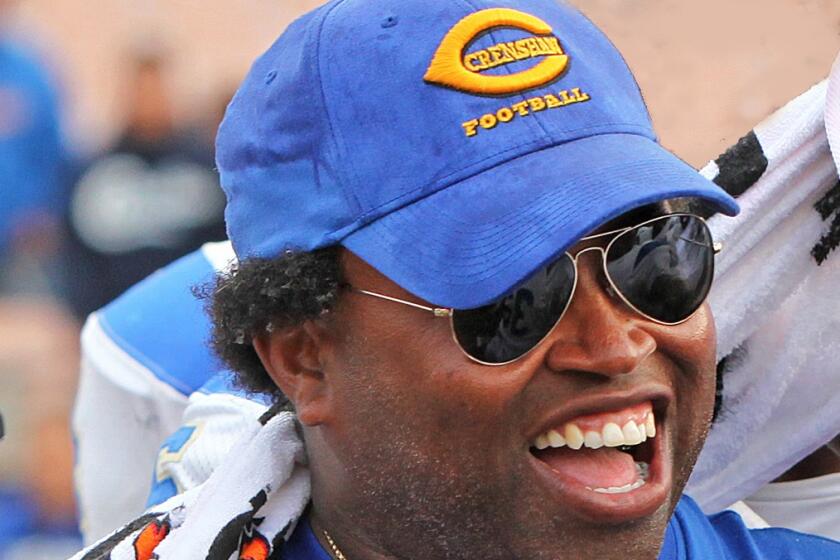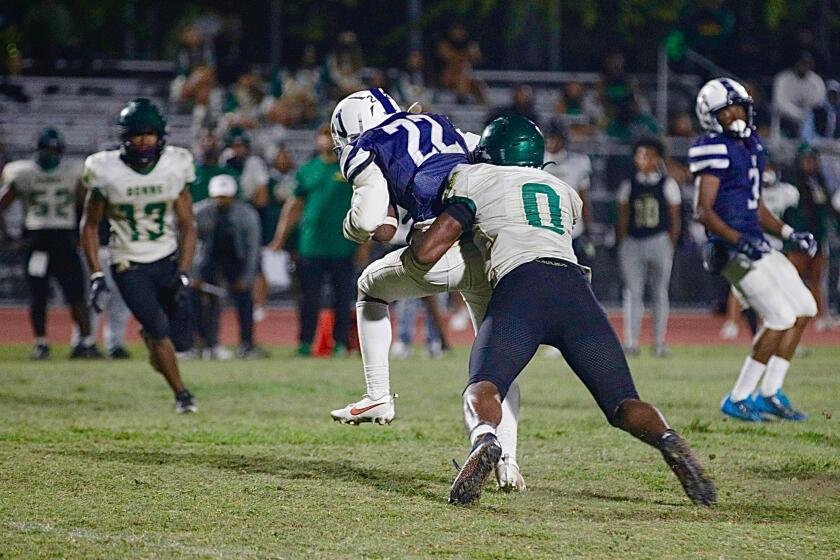He Wouldn’t Let Moorpark Settle for Less
The first chord was struck in August, when Moorpark High football Coach Rob Dearborn confided his deepest fear: He would be run out of town if he didn’t produce a winning season.
My only thought at the time was that Moorpark must be a retirement community, because its football team had last won a championship in 1941. Who could remember?
I gave Moorpark little thought until about five weeks later when Bryan Wilkins, a returning All-Golden League running back, withdrew from Littlerock High and enrolled at Moorpark. Through the first three weeks of the 1993 season, Wilkins, a 6-foot, 180-pound junior, was leading the Golden League with 420 yards rushing and six touchdowns.
A savior had come to spare Dearborn his job, I thought.
That’s what eventually happened, but this story wasn’t so simple.
The reason for Wilkins’ transfer was the death of his father, Wesley Wilkins, who had succumbed to cancer the previous October. Bryan lived in Littlerock with his father and stayed there for nearly a year after his death. Now he was moving to Moorpark to live with his mother. He knew nobody in Moorpark.
Many boys facing such circumstances, I figured, would just as soon go off on their own and quietly grieve than join a new football team.
But I knew Wilkins was different the instant I met him for a story about his transfer. At 16, he had an understanding about life and death. When it came to his father, he had accepted the outcome. He was at peace with it. He was ready to move on, but, through football, he would always pay tribute to dad.
“I think about how much I miss (my father), and every game I play for him,” Wilkins said. “I’m dedicating everything to him.”
Physically, he was strong and well conditioned--he already looked like a Division I football player. But more impressive was his quietly powerful demeanor. Dearborn insisted on sitting in on the interview, monitoring the subject matter. However, he seemed to disappear once Wilkins started talking.
When the interview was over, Wilkins grabbed his helmet and shoulder pads and went to practice. Dearborn pulled me aside and unfolded a clipping of a newspaper story about another Moorpark player who had previous run-ins with the law. Dearborn was concerned about negative press.
It seemed like a trivial concern at the time, which Dearborn could easily remedy by giving the ball to Wilkins 20 times each game, I thought.
Two weeks later, the Moorpark school board acknowledged that it was investigating the football program. After an emotional confrontation between board and team members, and after the board failed to find evidence of any Southern Section rules violations, the investigation was dropped.
But Dearborn’s fear of getting chased out of town seemed to have merit.
By week eight, his team was 5-1-1 and facing its biggest game in 52 seasons. If the Musketeers could beat Nordhoff, the defending Frontier League champion, they would take a big step toward winning their first league championship in more than half a century.
However, I had become part of a growing sideline gallery who questioned Dearborn’s judgment. Moorpark had used three running backs before Wilkins’ arrival. It was our opinion that Dearborn should find other positions for those boys and start handing the ball to Wilkins, who had rushed for 1,279 yards in 1992.
Dearborn appeared bent on keeping players happy. He continued to call on the other running backs. This policy continued until halftime of the Nordhoff game. Moorpark trailed, 14-0, and Wilkins had only 36 yards rushing.
But the next 24 minutes were precious. The community would celebrate, the coach would get respect and at least one sports writer would get to write the story he wanted.
“Dearborn Gives Ball to Wilkins; Wilkins Carries Moorpark to Championship.”
On the first possession of the second half, Wilkins scored on a 27-yard sweep on which he hurdled a defensive back at the five-yard line to make the score 14-7.
Late in the third quarter with Moorpark trailing, 21-14, Wilkins burst nine yards up the middle for a touchdown, capping a 41-yard drive on which he gained every yard.
In the fourth quarter, Wilkins carried 11 times on a 13-play, 82-yard drive that took nearly 7 1/2 minutes. Wilkins couldn’t be stopped on sweeps, breaking loose for 12, 14 and 21 yards before he swept into the end zone on a four-yard run.
Wilkins raced to the Moorpark sideline, slid on the grass and pumped his fists in front of a screaming crowd.
A stranger who had rescued a beleaguered football community, Wilkins was mobbed after Moorpark’s 26-21 victory. He finished with 223 yards and three touchdowns in 34 carries. He caught two passes for 60 yards.
Moorpark went on to win the league championship, posted the best record in school history (9-2-1) and reach the second round of the Southern Section Division IX playoffs. He finished the season with 1,402 yards rushing.
Said Wilkins: “I’m just glad to be a part of this.”
More to Read
Get our high school sports newsletter
Prep Rally is devoted to the SoCal high school sports experience, bringing you scores, stories and a behind-the-scenes look at what makes prep sports so popular.
You may occasionally receive promotional content from the Los Angeles Times.






